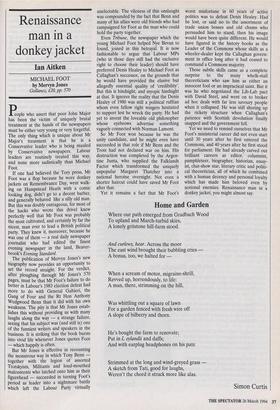Renaissance
man in a
donkey jacket
Ian Aitken
MICHAEL FOOT by Mervyn Jones Gollancz, £20, pp. 570 People who assert that poor John Major has been the victim of uniquely brutal treatment at the hands of the newspapers must be either very young or very forgetful. The only thing which is unique about Mr Major's treatment is that he is a Conservative leader who is being mauled by Conservative newspapers. Labour leaders are routinely treated this way, and none more sadistically than Michael Foot.
If one had believed the Tory press, Mr Foot was a flop because he wore donkey jackets on Remembrance Day, went walk- ing on Hampstead Heath with a comic looking dog, didn't go to a decent barber, and generally behaved like a silly old man. But this was doubly outrageous, for most of the hacks who wrote this drivel knew perfectly well that Mr Foot was probably the most cultivated, and certainly by far the nicest, man ever to lead a British political party. They knew it, moreover, because he was one of them — a real daily newspaper journalist who had edited the finest evening newspaper in the land, Beaver- brook's Evening Standard. The publication of Mervyn Jones's new biography now provides an opportunity to set the record straight. For the verdict, after ploughing through Mr Jones's 570 pages, must be that Mr Foot's failure to do better in Labour's 1983 election defeat had more to do with General Galtieri, the Gang of Four and the Rt Hon Anthony Wedgwood Benn than it did with his own weakness. The pity is that Mr Jones estab- lishes this without providing us with many laughs along the way — a strange failure, seeing that his subject was (and still is) one of the funniest writers and speakers in the business. It is striking that the book bursts into vivid life whenever Jones quotes Foot — which happily is often. But Mr Jones is effective in recounting the monstrous way in which Tony Benn — together with the legion of assorted Trotskyists, Militants and loud-mouthed malcontents who latched onto him as their figurehead — succeeded in turning Foot's period as leader into a nightmare battle which left the Labour Party virtually unelectable. The vileness of this onslaught was compounded by the fact that Benn and many of his allies were old friends who had campaigned for Foot as the man who could hold the party together.
Even Tribune, the newspaper which the young Michael Foot helped Nye Bevan to found, joined in this betrayal. It is now fashionable to argue that Labour MPs (who in those days still had the exclusive right to choose their leader) should have preferred Denis Healey to Michael Foot as Callaghan's successor, on the grounds that he would have provided the elusive but allegedly essential quality of 'credibility'. But this is hindsight, and myopic hindsight at that. It ignores the reality that the Denis Healey of 1980 was still a political ruffian whom even fellow right wingers hesitated to support lest he wreck the party. He had yet to invent the loveable old philosopher whose eyebrows advertise something vaguely connected with Norman Lamont.
So Mr Foot won because he was the unity candidate, and he might even have succeeded in that role if Mr Benn and the Trots had not declared war on him. His destruction was completed by the Argen- tine Junta, who supplied the Falklands Factor which transformed the uniquely unpopular Margaret Thatcher into a national heroine overnight. Not even a shorter haircut could have saved Mr Foot after that.
Yet it remains a fact that Mr Foot's worst misfortune in 60 years of active politics was to defeat Denis Healey. Had he lost, or said no to the assortment of trade union bosses and old chums who persuaded him to stand, then his image would have been quite different. He would have figured in the history books as the Leader of the Commons whose skills as a wheeler-dealer kept the Callaghan govern- ment in office long after it had ceased to command a Commons majority.
Those subtle skills came as a complete surprise to the many whelk-stall theoreticians who saw him as either an innocent fool or an impractical saint. But it was he who negotiated the Lib-Lab pact with David Steel, and went on to broker ad hoc deals with far less savoury people when it collapsed. He was still shoring up the rickety structure when Callaghan's patience with Scottish devolution finally snapped and the government fell.
Yet we need to remind ourselves that Mr Foot's ministerial career did not even start until 30 years after he first entered the Commons, and 40 years after he first stood for parliament. He had already carved out brilliant careers as editor, columnist, pamphleteer, biographer, historian, essay- ist, chat-show star, literary critic and politi- cal theoretician, all of which he combined with a human decency and personal loyalty which has made him beloved even by notional enemies. Renaissance man in a donkey jacket, you might almost say.


























































 Previous page
Previous page